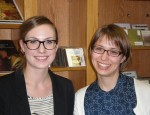Shannon McLeod, left, and Rachel Yaroshuk. (photo by Olga Livshin)
Unlike academic and institutional libraries, most small public libraries in North America don’t offer ebooks to their readers. Setting up a digital borrowing system requires hours of research and special computer knowledge. It is an expensive endeavor, too, besides presenting several legal wrinkles. Isaac Waldman Jewish Public Library at the Jewish Community Centre of Greater Vancouver is the first Jewish public library in Canada to do so.
In September 2013, the Waldman Library hired two digital content managers, Rachel Yaroshuk and Shannon McLeod, to organize the library’s digital portal. Both have master’s degrees in library and information studies from the University of British Columbia.
In an interview with the Independent, Yaroshuk and McLeod explained that the project grew out of the endowment to the library from the Sonner family, which was established 10 years ago. Eric Sonner, a Holocaust survivor and a local businessman, initiated the endowment.
McLeod said: “Eric was an avid reader. He established a fund with the Jewish Federation of Greater Vancouver for the benefit of the library. The fund was to sit for 10 years, and the interest would finance the library needs. Eric passed away in 2009. After the 10-year term ended in 2013, Eric’s daughter, Eve, approached the library with the idea to launch a unique Jewish ebook collection at the library, using the principle capital. She thought that such a project would be a fitting way to use the money, as her father liked to be cutting edge in his thinking and actions. He also had a strong commitment to the Jewish community and highly valued the library’s contribution.”
Of course, the library embraced the Sonner Family eBook Project, one that would honor the life and values of Eric Sonner. “We want to keep up with the rest of the world,” said librarian Karen Corrin about the new collection. “Everybody is excited about ebooks.” To take this idea from intentions to execution wasn’t easy, however: it took two dedicated professionals and a lot of hard work.
Yaroshuk recalled: “I was working as an on-call librarian at the New Westminster Library when Karen contacted me. We met, and I knew it’s too much for one person. We needed a team of two, so they hired my friend, Shannon. We both studied at the same program at UBC and worked together. Having a good partner is important for such a complex project.”
They started out by looking at possible digital content providers. “We had limited options,” said Yaroshuk. “Only a few suppliers offer ebooks to libraries in Canada. There are legal restrictions. And we needed to find Jewish content. Not all the books are available in e-format. We ended up with OverDrive, one of the leading ebook suppliers for libraries in Canada. The format offered is ePub. Many devices can read it: tablets, Kobo reader, iPhone. The library signed a four-year contract with OverDrive.”
“We’re still building the collection. For now, it includes about 50-50 fiction and non-fiction, children’s and adult books. We’d like some feedback from the community before proceeding.”
At first, 50 books will be available to library patrons, but Yaroshuk noted that it’s only a start. “We’re still building the collection. For now, it includes about 50-50 fiction and non-fiction, children’s and adult books. We’d like some feedback from the community before proceeding.”
McLeod also outlined some technical considerations they faced. “There was a problem of online integration,” she explained. “The digital content doesn’t sit at the library – it’s on the OverDrive servers, but the users will be able to access it from the library catalogue.”
Users will be able to link to it from the library catalogue and download ebooks. They will be able to do so from the library or from anywhere in the world, even from home, as long as they have an internet connection and a library card.
According to McLeod, OverDrive has built a special website for Waldman. It looks similar to the library website and uses the same color scheme. Users will be able to link to it from the library catalogue and download ebooks. They will be able to do so from the library or from anywhere in the world, even from home, as long as they have an internet connection and a library card. After three weeks – a standard library borrowing time – the file will disappear from their reading devices.
The computer aspects, as well as the finding and cataloguing of all the books, took time, but now the system is almost ready. It goes live at the end of February.
“It’s a soft launch,” said Yaroshuk. “The official launch is in the beginning of March, but now the next phase of the project starts – to train everyone to use the new system. We’ll have posters, video instructions and printed handouts, color coordinated for different devices. We’ll have demonstrations and one-on-one sessions for the JCC staff, library volunteers, seniors groups, school kids. We are preparing promotional materials to let everyone know about the new service.”
Of course, an ebook needs an e-reader, and not everyone is comfortable with the idea of digitized books just yet, or even owns an electronic reader, especially older adults. “We’d love to offer some e-readers, too, so people could borrow them as well as ebooks, as the VPL is doing, but it’s expensive,” Corrin said.
As representatives of a younger generation, both McLeod and Yaroshuk own e-readers, but “… I love physical books,” said McLeod. “I don’t think ebooks will replace print; they are just a convenient supplement. When you commute or travel, you can have a few ebooks on your device and not worry that you’ll have nothing to read when you finish a book. And the devices are light.”
For information about the ebook collection, call 604-257-5111, ext. 252, or email [email protected].
Olga Livshin is a Vancouver freelance writer. She can be reached at [email protected].

